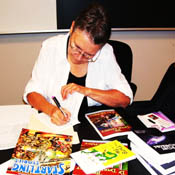Please welcome Gail McAbee new Rogue Phoenix Press Author. Her book Miss Mayfair's Dilemma will be published May 2014.
Pity the poor adverb,
the least respected, most abused part of speech.
First of all, there’s
the brawny verb, always doing something energetic, kind of the Hulk of grammar,
smashing or running or jumping or, in some case, simply being. Run. Dance.
Write. Laugh. Exterminate. You can almost hear his shirt tearing.
Then there are the
nouns, the prima donnas of the parts of speech. “We’re the names of things,”
they whine. “Everything, but everything has a naaaame.” Table. Chair. Computer.
Pen, paper, ink…you can understand how nouns have swollen heads. They’re
surrounded, submerged, all but drowning in things they represent.
And where there are
nouns, there must be adjectives, the handmaidens, the servants, the toadies. We
don’t just have a table; oh, no. We have a large, wooden, shiny, heavy, sturdy,
gleaming, antique table. It’s not just a pen; it’s a fine-point black-ink gel
pen. The sky is blue, or gray or cloudy. The sun is a brilliant bright orange.
Adjectives: the sycophants of grammar.
But as if nouns didn’t
already have swollen heads about themselves, they also have to have an entire
class of words to take their place. It’s
almost as if the poor overworked nouns need to run off to the Hamptons for a
long weekend once a month or more, so bring in the pronouns. While my sister is slathering on sunscreen, she is taking her place in a sentence.
Even our old bright brilliant friend the sun may be off dancing with the moon,
while it is subbing way up in the
sky.
Prepositions,
conjunctions, interjections, all little guys wandering around in sentences, but
they get plenty of notice and pats on their little heads. Prepositions even get
objects, and conjunctions are like chains or pivot points, joining up things.
And don’t even get me started on interjections, those excitable little dudes
who get exclamation points! Wow! Cool! Awesome!
Then, sneaking along
behind, embarrassed to be seen, picking up crumbs at the grammar banquet with
their little –ly tails dragging in the dust behind them, there’s the lowly
adverb. Gone are the adverbial glory days—if they ever existed. Read what Mark
Twain had to say about the poor guys:
“I am dead to adverbs;
they cannot excite me. To misplace an adverb is a thing which I am able to do
with frozen indifference; it can never give me a pang. ... There are subtleties
which I cannot master at all,--they confuse me, they mean absolutely nothing to
me,--and this adverb plague is one of them. ... Yes, there are things which we
cannot learn, and there is no use in fretting about it. I cannot learn adverbs;
and what is more I won't.”
Ouch! Well, yes, okay,
it’s true. Adverbs can be a sign of weak writing, a cry for stronger verbs. But
don’t they deserve a little respect instead of being ostracized and sent into
the outer darkness? If someone is eating voraciously, isn’t that easier to say
than ‘as if he hasn’t had a meal in days’ if only for word count alone?
I confess it, loud and
proud: I have any unholy passion for the red-headed step-child of grammar, the
lowly adverb. So sue me.
And don’t even get me
started on semicolons…
—
K.G. McAbee has
written a bunch of books in genres like Regency, fantasy, Steampunk, pulp, YA
and horror, some of them quite readable. Her short work can be found in a whole
other bunch of anthologies. She lives in upstate SC in a haunted 200 year old
log cabin with gorgeous husband and spoiled dogs. Check out her author page at
Amazon for more info: https://www.amazon.com/author/kgmcabee or email her at kgmcabee@gmail.com
Buy LInks: Here are some of Gail's books
Buy LInks: Here are some of Gail's books


Thank you for the light look at language. I'm with you, I'm an adverbitite. I really, really like the impact they have on my stories.
ReplyDeleteC. L. Kraemer